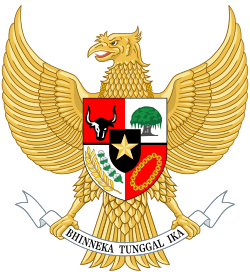Bangladesh–Indonesia relations
Bangladesh–Indonesia relations refers to the bilateral relations of Bangladesh and Indonesia. Indonesia is the world's largest Muslim country, whereas Bangladesh is the world's fourth largest Muslim country. They are partners in the United Nations and various multilateral organisations, particularly in international peacekeeping, the Developing 8 Countries, the Non-Aligned Movement, the World Trade Organization and the Organisation of Islamic Cooperation. Bangladesh has an embassy in Jakarta, whereas Indonesia has an embassy in Dhaka. Official diplomatic relations were established in 1972 after Indonesia became one of the first Muslim countries to recognise independent Bangladesh.[1]
 | |
Bangladesh |
Indonesia |
|---|---|
History
The contacts between the Bay of Bengal region with Indonesian archipelago has commenced since centuries ago. Indonesia and Bangladesh were connected to maritime Silk Road of Indian Ocean trade network, where goods travels and ideas exchanged. Since early 4th-century Indonesia has received Hindu, and subsequently Buddhist influences from Indian subcontinent. In 9th-century the Srivijaya empire established contacts through religious and education relations with Buddhist schools, monasteries and universities in ancient India and Bangladesh, such as Nalanda and Somapura.[2][3]
After the separation of Bangladesh from Pakistan, Indonesia along with other non-Arab Muslim countries such as Malaysia, Turkey and Afghanistan immediately recognised Bangladesh sovereignty in 1971. Subsequently, Bangladesh soon after its independence in 1971 established diplomatic relations with Indonesia and the Embassy started functioning from May 1972.[4]
Country comparison
| Country | ||
|---|---|---|
| Area | 147,570 square kilometres (56,980 sq mi) | 1,904,569 square kilometres (735,358 sq mi) |
| Population | 162,951,560 (2016) | 261,115,456 (2016) |
| Pop. density | 1,106 inhabitants per square kilometre (2,860/sq mi) | 138 inhabitants per square kilometre (360/sq mi) |
| Capital | Dhaka | Jakarta |
| Largest city | Dhaka – 14,399,000 (20,000,000 Metro) | Jakarta – 10,075,310 (30,214,303 Metro) |
| Government | Unitary parliamentary constitutional republic | Unitary presidential constitutional republic |
| Language(s) | Bengali (official) | Indonesian (official) |
| Religions | 90.39% Islam, 12.1% Hinduism, 0.6% Buddhism, 0.4% Christianity, 0.3% others | 87.2% Islam, 9.9% Christianity, 1.7% Hinduism, 0.7% Buddhism, 0.2% Confucianism |
| Ethnic groups | 98.0% Bengalis, 2.0% Minorities (Garo, Khasi, Meitei, Rohingya, Santal, Tripuri, etc.) | 42.6% Javanese, 15.4% Sundanese, 3.4% Malays, 3.3% Madurese, 3% Batak, 2.7% Minangkabau, 2.5% Betawi, 2.4% Bugis, etc. |
| GDP | $0.286 trillion (nominal, 2018); $0.752 trillion (PPP, 2018) | $1.074 trillion (nominal, 2018); $3.492 trillion (PPP, 2018) |
| GDP per capita | $1,751 (nominal, 2018); $4,562 (PPP, 2018) | $4,051 (nominal, 2018); $13,162 (PPP, 2018) |
| GDP growth rate | 7.8% (2018) | 5.1% (2017) |
| Main industries | Textiles, pharmaceuticals, electronics, shipbuilding | Palm oil, coal, petroleum, textiles |
| Labor force | 109 million (2017) | 125 million (2016) |
| HDI | 0.608 (Medium) | 0.707 (High) |
Cooperations
Both nations welcomes initiatives in furthering the bilateral co-operation in various areas including trade and investment, agriculture, defence, education, food security, good governance, counter-terrorism, research and technology as well as disaster mitigation and management.[5] Besides bilateral co-operation, both nations exchanged their views on the two countries' co-operation in regional and global fora. As the Muslim majority countries, both nations also exchange view and voiced their concern on addressing the Rohingya Muslim refugees issue in neighbouring Myanmar.[6]
At the end of October, both Bangladesh and Indonesia saw strikes involving millions of low-wage workers demanding substantial increases in their minimum wages.[7] Semen Indonesia, the country's largest cement maker, is mulling over plans to expand its business to Bangladesh in efforts to capitalize on Bangladesh's rising consumer demand.[8] Bangladesh, Indonesia and Iran were rated as the nations most at risk from extreme weather and geophysical events according to a 2010 study. , Global risks advisory firm Maplecroft, had developed the Natural Disasters Risk Index (NDRI) to enable businesses and insurance companies to identify risks to international assets.[9]
Trade
Indonesia have recently signed a deal with a Bangladesh pharmaceutical company to export its goods to their country where Bangladesh sees another potential market for its pharmaceutical products.[10] Trade between the two countries amounted to US$1.53 billion in 2017.[11]
References
- Ali, Syed. "Bangladesh and the OIC". The Daily Star. Retrieved 6 June 2014.
- "EurASEAA 14". sharpsands.com.
- "Trade and Commerce". banglapedia.org.
- "Welcome Message". Bangladesh Embassy in Indonasia. Retrieved 6 June 2014.
- "Minister Marty Visits Bangladesh". The Consulate General of the Republic of Indonesia in Dubai, Ministry of Foreign Affairs, Republic of Indonesia. Retrieved 4 June 2013.
- Jafar M Sidik (2 April 2013). "Indonesia, Bangladesh discuss Rohingya issue". Antara News. Retrieved 4 June 2013.
- "Indonesia, Bangladesh workers battle low wages". Retrieved 6 June 2014.
- "Semen Indonesia Considers Plans for Bangladesh Expansion". The Jakarta Globe. Retrieved 6 June 2014.
- "Bangladesh, Indonesia and Iran top natural disaster ranking - France, Italy, USA at "high risk"". Retrieved 6 June 2014.
- "Eskayef becomes first local firm to export medicine to Indonesia". The Daily Star.
- "Indonesia, Bangladesh agree to boost economic ties". The Jakarta Post. 29 January 2018. Retrieved 20 April 2018.
